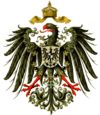Saxe-Meiningen
Duchy of Saxe-Meiningen Herzogtum Sachsen-Meiningen | |||||||||
|---|---|---|---|---|---|---|---|---|---|
| 1675–1918 | |||||||||
| Anthem: Vaterlandsgesang der Sachsen-Meininger | |||||||||
| Status | State of the Holy Roman Empire, State of the Confederation of the Rhine, State of the German Confederation, State of the North German Confederation, State of the German Empire, State of the Weimar Republic | ||||||||
| Capital | Meiningen | ||||||||
| Government | Principality | ||||||||
| Duke | |||||||||
• 1675 – 1706 | Bernhard I | ||||||||
• 1914 – 18 | Bernhard III | ||||||||
| Historical era | Middle Ages | ||||||||
• Established | 1675 | ||||||||
| 1918 | |||||||||
• Merged into Thuringia | 1920 | ||||||||
| Area | |||||||||
| 1905 | 2,468 km2 (953 sq mi) | ||||||||
| Population | |||||||||
• 1905 | 269000 | ||||||||
| |||||||||
The Duchy of Saxe-Meiningen was one of the Ernestine duchies.
The dukes were never very important in forming the history of Europe, and unlike their relative in the Duchy of Saxe-Coburg and Gotha never set out to form a long lasting dynasty.
Like all of the German monarchies the duchy became part of the Weimar Republic after World War I.
In the reshuffle of Ernestine territories after the death of the Saxe-Gothaducal line in 1825, Saxe-Meiningen got the territories of Hildburghausen and Saalfeld. The state of Saxe-Meiningen was merged into the new state of Thuringia in 1920.
The capital of Saxe-Meiningen was Meiningen; it had an area of 2,468 km² and a population of 269,000 (1905). The summer residence was Altenstein.
The present head of Head of the Ducal House of Saxe-Meiningen is Prince Frederick Konrad (born 1952).
Dukes of Saxe-Meiningen
[change | change source]- Bernhard I (1675 – 1706)
- Ernst Ludwig I (1706 – 24), son of Bernhard I
- Ernst Ludwig II (1724 – 29), son of Ernst Ludwig I
- Karl Frederick (1729 – 43), son of Ernst Ludwig I
- Frederick Wilhelm (1743 – 1746), son of Bernhard I
- Anton Ulrich (1746 – 63), Son of Bernhard I
- Karl Wilhelm (1763 – 82), son of Anton Ulrich
- Georg I (1782 – 1803), son of Anton Ulrich
- Bernhard II (1803 – 66), son of Georg I
- Georg II (1866 – 1914), son of Bernhard II
- Bernhard III (1914 – 18), son of Georg II
Dukedom abolished in 1918
Heads of the Ducal House of Saxe-Meiningen, post monarchy
[change | change source]- Bernhard III (1918-1928)
- Prince Georg (1928 – 46)
- Prince Bernhard (1946 – 84)
- Prince Frederick Konrad (1984 – present)
Related pages
[change | change source]Other websites
[change | change source]- "Saxe-Meiningen Family Genealogy". Archived from the original on 2012-06-30. Retrieved 2007-11-05.
- Ernestine duchies
- German Empire
- States of the Confederation of the Rhine
- States of the German Confederation
- States of the German Empire
- States of the Holy Roman Empire
- States of the North German Confederation
- States of the Weimar Republic
- Thuringia
- 1670s establishments in Europe
- 17th-century establishments in Germany
- 1920 disestablishments in Europe
- 20th-century disestablishments in Germany




